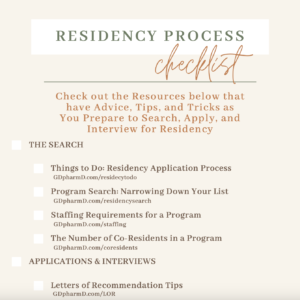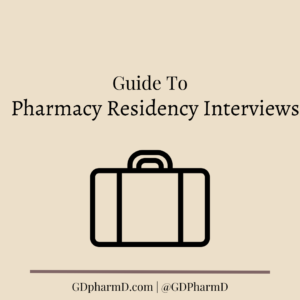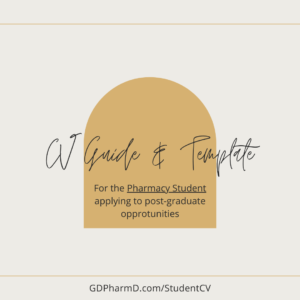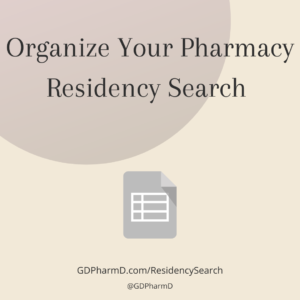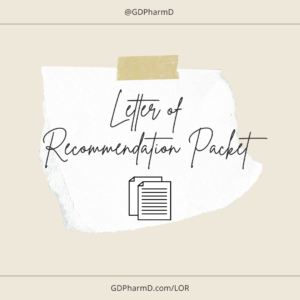Heyyy! I’m back again with another application-related post about letters of recommendation for pharmacy residencies. It can be really tough to navigate this process and I want you to not only feel but be as prepared as you can. I’m giving you all the tips and tricks to make the process easier and I even have a downloadable file of a guide for a letter of recommendation packet (yes yall I made a packet for my letter writers!!) towards the bottom of this post!
Look for the ⚡️ symbol for PRO-TIPS
⚡️ I am only sharing what I did and my personal experience. Everyone does this differently. Keep in mind, no specific way guarantees anything. I can only share my experience. Please also keep in mind that while general principles may apply to other career endeavors beyond pharmacy residencies, this was written with the pharmacy resident applicant in mind.
The Importance of Letters of Recommendation (LOR)
I’ll keep it short & sweet on this one. There are two camps when it comes to the importance of LOR. A camp that values LOR because they believe it gives good insight into the candidate and can possibly give insight into any concerns they have about a candidate.
The other camp wonders if LORs are even useful at all because the majority are so positive so how can you distinguish between the candidates when all the letter writers rave about the candidates?
Either way, I think it’s important to put your best foot forward when applying because you never know the viewpoint of the program you are going to!
A Brief Overview of the Process
Essentially, once you’ve identified (and asked!) who your letter writers will be, you’ll enter their information into the PhORCAS system. PhORCAS will send them an email with a link that will allow them to fill the LOR form out.
What does the Letter of Recommendation for Pharmacy Residencies Entail?
Surprisingly enough, the LOR for pharmacy residencies isn’t your typical recommendation letter. It’s a survey, has open-ended responses, and has an option to upload a formal letter. The updated 2023 version is more involved than previous years, so be sure to familiarize yourself with it. Click this Link (or this one for a different view) to see the LOR form (updated with the NEW 2023 version).
- There are 14 ‘characteristics’ + 13 Reference Relationship/Narrative Comments + a ‘Recommendation Option + a place where a writer may upload an actual letter (optional).
When I applied to residency, there was a different type of Letter of rec, so you may want to alert your letter writers that the template has changed.
⚡️ ASHP also has a great document on best practices on LOR! Click Here. Definitely take a look at it for visuals.
Who Should I Ask for a Letter of Recommendation?
It’s a good idea to ask those who have seen your work ethic and know you well in the professional sense. This can include professors, mentors, preceptors, supervisors, managers, etc. Make sure they can speak well about you, your abilities, and how your long-term goals align. Also, ask yourself if they are reliable, as in, can they write the letter by the deadline?
I asked a mix of preceptors from inpatient hospital settings, to outpatient ambulatory care, to long-term care, and the pharmaceutical industry. I felt as though I did well on those rotations and was able to form a bond with the preceptor and produce good work while I was with them.
⚡️ Some programs have specifics on who they want to write your letter, so keep that in mind. For example, they may say, ‘At least one LOR must be from a preceptor on APPE rotations’ as a requirement. Some programs don’t offer specifics which is fine.
When do I ask for a Letter of Recommendation?
At the end of the rotation, is usually when I ask. For the APPE rotations associated with my school, the preceptors did an evaluation at the end of the rotation and when the evaluation was done, I would ask said preceptor. Try to ask and have who will be writing your letters identified at least a month or so before ASHP mid-year (which is usually the first/second week of December).
How do I ask for a Letter of Recommendation?
For me personally, I asked preceptors I had on rotations (and of course asking other people besides preceptors you had on rotations would be 100% appropriate such as mentors, professors, research lead..etc). On rotations, I was pretty intentional about getting feedback regularly like on a weekly basis, and from that, I was able to gauge how the preceptor viewed my ability. Based on that, how much I enjoyed my rotation, how much I felt I communicated my goals, and somewhat bonded with the preceptor, towards the end of the rotation, I asked myself if it would be worth a shot asking them for an LOR.
I said something along the lines of “Thanks for the evaluation and the rotation, I really enjoyed this rotation, and thanks for all the time you’ve put into the rotation. As you may know, I am pursuing a pharmacy residency and I would like to ask if you would be willing and able to write me a strong and positive letter of recommendation.”
Of course, make this your own, but recognize that it has a few key components: your appreciation, re-iterating your goals, how they can help you achieve them, and emphasizing that you would like a strong and positive letter.
⚡️ I will add a disclaimer for those who may not know my whole story, basically, I didn’t have a residency on my radar until a few months into APPE rotations, so for one of my letters I emailed the preceptor – she was super nice and a great preceptor and didn’t sweat it at all!! But, I wouldn’t make that normal practice especially if you can ask face-to-face. The reason why I chose letter writers who were my preceptors is essentially (but not entirely) for the same reason of residency being on my radar later than most.
What if They Say No?
That’s tough, I know. But don’t force it on them. It can be for numerous reasons including that they just may not have the capacity to take on another responsibility. It could be a blessing in disguise, people will say yes.
How Many Letters of Recommendations Should I Ask For?
Programs have different requirements, so definitely check, but I’ve seen anywhere from 3-4 letters being required for the application.
⚡️ Of note, for each application you send to a program, you’re able to select which letter goes to which program. So if 4 people submitted a letter for you via PhORCAS and you’re applying to a program that only requires 3, you can select which 3 letters you’re going to select for that specific program.
How and When to Communicate with the Letter Writers and How Often?
Keep open lines of communication, always. Most (but not all) PhORCAS applications are due January 1st, so try to make the deadline for your letter writers a few days (or even a week) beforehand just to give a good amount of buffer time. Keep in mind, this is around the holidays (Thanksgiving, Christmas, and New Year’s) so it’s a busy time when people may be off from work and just busy!
I communicated with my letter writers probably three-ish times to keep them updated unless they needed more information from me. Try not to hound them, they likely have other responsibilities (both professional and personal) and could also be writing other LOR.
(1) Once in early November as a general touch-base:
⚡️ Attach the sample LOR form to this initial email so that they have an idea of what questions they’ll be answering (especially if it is someone’s first time doing this).
(2) Once a few weeks before mid-year just as a touch base/reminder and reassured them that I would be in contact with them closer to mid-year with a prospective list of places:
⚡️ I attached materials that I’ll discuss more towards the end of the blog post AND let them know that I initiated the process via PhORCAS and that they should be receiving an email within 24 hours. More on the materials I attached toward the end of the blog post!
(3) Once after mid-year:
⚡️ Keep in mind, that this is around the holidays so people will be busy, so that’s why it was so important to be proactive.
What do I give to my Letter Writers?
So when someone is writing a letter of recommendation for you, regardless of how well you all know each other, you should provide them with something about you. At the very least, your CV.
Me being me, I made a letter of recommendation packet. I know, I know, it seems extra, but I wanted to make it as easy as possible for my letter writers to write and give them many data points and examples and it was truly a game-changer for keeping everyone organized
What did my Letter of Recommendation packet Include?
It included a good amount of information for me that they could pull from to help them with the letter. It had my CV, a little about my goals, why residency..etc, etc. During the process, my letter writers commented on how organized and how much easier it was for them to do my letters. If you would like a copy of the template of this packet, you can purchase and download it here:
Download the Letter of Recommendation Template Here
If you have letter writers who aren’t familiar with this process or residency in general, you may want to add more details about residency and what you’ll be doing during your time there to give them good context to write your letter.
Overall, be organized and make it easy for your letter writers, they will thank you and it’ll show in your letter! Be professional & mindful that letters take a long time to do!
Random last point
Unsure if anyone needs this, but, one of the last free-response questions is this one.
When I was applying to residencies, I was confused about this part. Some people were requesting each of their letter writers to do an entirely new letter with a custom note of why a specific program connected to them as a candidate. I DID NOT do that, but I know others who did. Once again, look at ASHP’s best practices PDF as page 2 has some scenarios to consider.
Last last point LOL
Always be sure to keep your letter writers updated on the outcome of the job, residency, fellowship, internship, or whatever the letter was for – they are a part of your network now! Also, be sure to give a final thank you – whether to give a gift, a card, or a thank you email is up to you!
More Resources
- PhoRCAS applicant presentation
- PhoRCAS FAQ
- PhoRCAS what’s new
- ASHP student residency resource center (you’ll need to sign in to access that content)
- General resources on PhORCAS
I hope this was helpful and gives you more insight and helps you feel more confident in this process. If you have any questions, feel free to leave them below or via Instagram. I wish you ALL the best! For more Residency content, check out the rest of my residency blog posts here and on Instagram. I have created guides and have an Instagram highlight called ‘Rx Resi Help.’
How foolish can you be? After starting your new lives in the Spirit, why are you now trying to become perfect by your own human effort? Galatians 3:3 NLT For God is working in you, giving you the desire and the power to do what pleases him. Philippians 2:13 NLT For we are God’s masterpiece. He has created us anew in Christ Jesus, so we can do the good things he planned for us long ago.
Ephesians 2:10 NLT

Things to Do: Residency Application Process
Pharmacy Residency Search: Finding Programs & Narrowing Down Your List
The Number of Co-residents in a PGY-1 Pharmacy Residency: Why it’s Important and How to Decide
Staffing During Pharmacy Residency: Should it Factor into Your Decision?
Mid-Year Tips (Virtual Edition)
Top Tips for Pharmacy Residency Interviews #InterviewSZN
